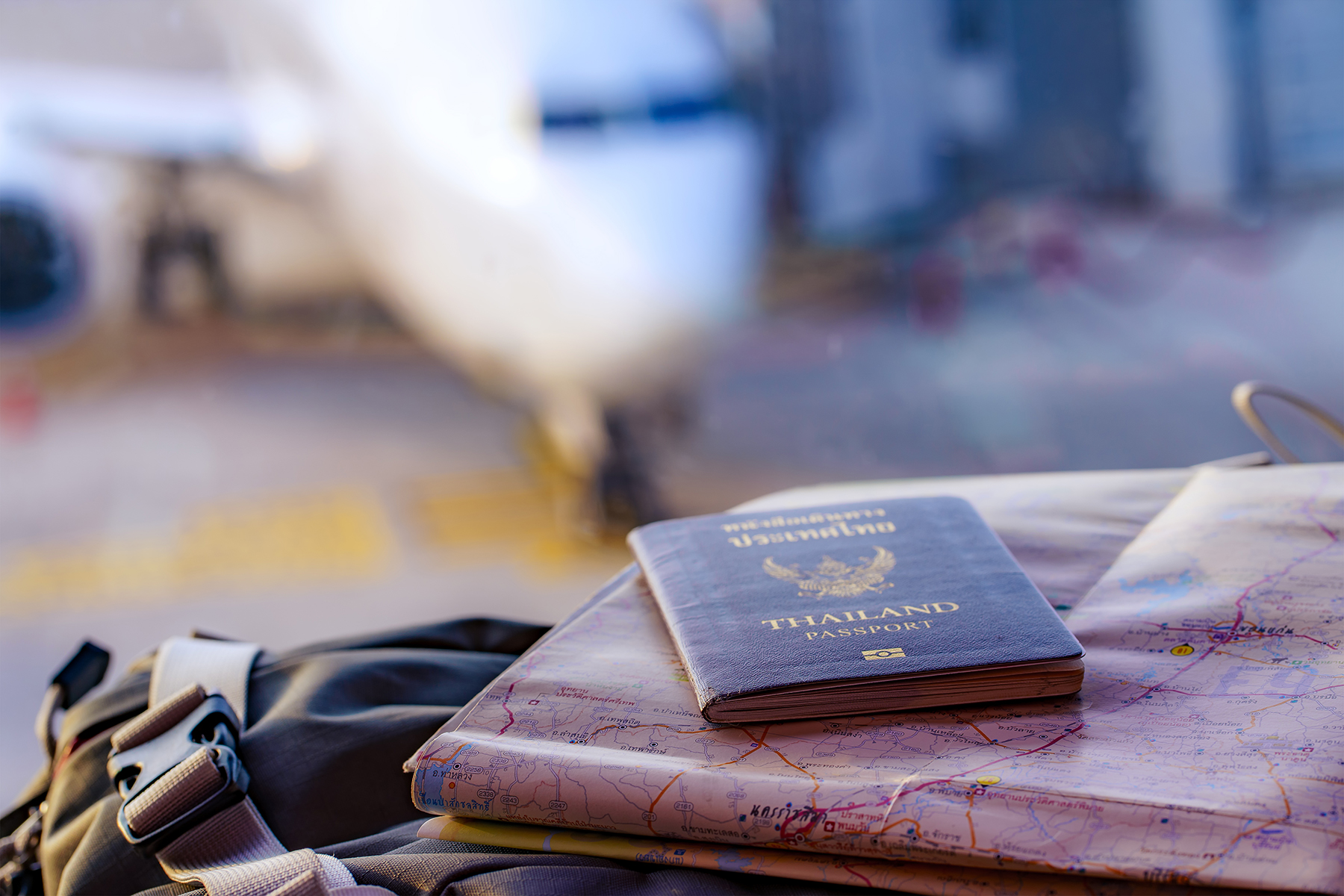Acquiring Thai nationality as an international opens doors to nearly all the same benefits enjoyed by native Thai citizens. While the process is lengthy and intricate, it can be rewarding, particularly if you’d like to own property or vote in Thailand. However, you might wonder if you’re required to give up your current nationality and which Thai citizenship benefits will remain inaccessible.
Read on to learn more about the following:
- Thai citizenship
- Thai citizenship by birth
- Thai citizenship by descent
- Thai citizenship by naturalization/residence
- Thai citizenship by marriage
- Thai citizenship by adoption
- Thai citizenship as a refugee or stateless person
- Citizenship test in Thailand
- Passports in Thailand
- Dual nationality in Thailand
- Losing or renouncing Thai citizenship
- Citizenship appeals and complaints in Thailand
- Useful resources
Thai citizenship
The Thai Ministry of Interior (กระทรวงมหาดไทย, Grasuang Mahaad Thai) manages acquiring and revoking citizenship in Thailand. The country’s most recent legislation on citizenship laws is the Nationality Act 1965 and its amendments.

Thai citizenship laws are stringent, and applying for citizenship is quite complicated. Further, the Thai government is passing new laws making citizenship more difficult to obtain and streamlining the process, so requirements are constantly subject to change.
Thailand uses both “jus sanguinis” (blood rights) and “jus soli” (rights of soil) to decide who can become a Thai citizen. However, most Thai nationality laws are based on “jus sanguinis.” In practice, anyone with a Thai parent can apply for citizenship. There are more complicated criteria if you were born in Thailand.
It’s also important to note that some of the information available about who can become a Thai citizen is unclear. You’ll often find contradictory information online when searching for this topic. But don’t worry; legal experts in naturalization can guide you through this process if you decide to apply for Thai citizenship.
Once you are a Thai citizen, you can get almost all the benefits of citizenship. However, you must wait five years before voting in Thai elections according to the country’s 2007 Constitution.
Thai citizenship by birth
If you were born in Thailand and one of your parents is Thai, you will automatically become a Thai citizen. However, if your mother is not Thai and your father is, and they aren’t married, you won’t automatically get citizenship by birth. In this case, your father must take a DNA test to prove you are Thai.
If you are not born to Thai nationals, you can still get citizenship if both your parents have permanent resident status. In this case, a child born here should automatically be able to get citizenship.
How to apply
For children of Thai parents, the standard birth registration process applies. If only one parent is Thai, that parent must go to register the birth. This ensures the child is automatically registered as a Thai citizen. You can register your child’s birth at your local government office within 30 days.

If a child has two Thai permanent resident parents, it is a good idea to consult a family lawyer before registering birth. This is especially important if you live in an area with few foreign residents.
To register a birth you should take the following documents to your local government office:
- Parents’ Thai ID cards or red books (permanent resident ID)
- House book (ทะเบียนบ้าน, tabien baan)
Thai citizenship by descent
You can get Thai citizenship by birth, even if you’re born abroad, as long as at least one of your parents is Thai. However, this only goes back one generation. This means that one of your parents needs to be a Thai citizen for this to be an option.
You don’t have to go to Thailand to get your passport and birth certificate. It is generally easier to apply for your child’s Thai citizenship in the country where you currently live.
How to apply
If a child has at least one Thai parent and was born outside Thailand the parents should take the following steps:
- Register the child’s birth in the country they were born
- Apply for a Thai birth certificate at the Thai Embassy in their country of residency
When you apply for a Thai birth certificate overseas the application process will depend on where you are applying. In general, required documents include:
- Birth certificate from your country of residence
- Thai ID cards of the parent(s)
- Passports/ID cards of the parent(s)
- Thai house book of the parent(s)
You should check with your local Royal Thai Embassy for their exact requirements.
Once you have your child’s Thai birth certificate, you can apply for a passport. When you return to Thailand, whether to visit or live, you can add your child to your house book.
Thai citizenship by naturalization/residence
Many foreigners first get permanent residence on their path to naturalization. This is the most common way to become a citizen if you don’t have Thai parents or a Thai spouse.

After applying for permanent residence, you must wait five years before applying to become a Thai citizen. There are other criteria you need to meet to become a naturalized citizen in Thailand, including:
- Be of legal independent age both in Thailand (20 years old) and in your home country
- Have five years of continuous residence in Thailand, as shown in your resident permit (red book/alien book)
- Have a job and earn at least ฿80,000 a month
- Have proof of paid income tax for the last three years
- Show proof of donations to Thai-registered charities
- Have a clean record
- Pass the Thai language test
There is also a points-based system that looks at things like your age, the security of your job, and other factors. This can even include your personality and knowledge of Thai society, culture, and language.
How to apply
If you’re ready to apply for Thai citizenship you need the following documents:
- Your passport
- Your alien book/residence certificate
- Your house book
- Your work permit and copies
- Passport photos
- Your last three years’ income tax returns
- Proof of employment, including a letter with details of your salary and contract length
- Copies of IDs of two Thai guarantors
It’s a good idea to check with your local office first, as you may also need to submit other documents. You will also need to pay a fee of ฿5,000 (฿10,000 when the new law comes into effect).
Submit these documents to the Police Headquarters, Special Division in Bangkok, or your local province. However, the government is making changes to the law. In the future, you should submit your application to the Department of Provincial Administration where you live.
Once you have submitted your application, it will undergo a thorough review process. You will have several interviews with the Thai Special Branch, the National Security Agency, and local police. Finally, the Special Branch will send your application to the Ministry of Interior, which will make the final decision.
In the past, citizenship applications could take up to several years to process, but the government recently passed a law speeding up the process. Once the law is enacted, it should take at most 150 days (90 days standard with up to two 30-day extensions).
It’s important to note that you should maintain your continuous residence, work, tax payments, and salary while your application is being processed.
Thai citizenship by marriage
The application process for citizenship through marriage is very similar to the process for people who apply as permanent residents. However, if you have a Thai spouse, you don’t need to be a permanent resident first.

There are still some criteria you must meet if your spouse is a Thai citizen, which vary by whether you have a Thai husband or wife.
In general, you must have been married for at least three years if you don’t have children and one year if you do. A clean criminal record is also necessary. However, unlike other categories of citizenship, there’s no need to worry about proving your Thai language competency, making the process more inclusive and less daunting.
If you are a man with a Thai wife:
- You need to earn at least ฿40,000 a month and have a work permit and income tax record for 3 years
- You need to have continuous residence in Thailand for at least 5 years
If you are a woman with a Thai husband, the Thai citizenship requirements are simpler:
- There is no minimum time period for living in Thailand, although the length of marriage requirements are the same
- You don’t need proof of earnings or a work permit
- Your husband must earn at least ฿20,000 a month. If he doesn’t earn that much your joint salary must be at least ฿20,000 a month. It’s important to note that you must have been working legally with a work permit.
- You need to be registered on a house book (ทะเบียนบ้าน) in Thailand
How to apply
The application process to apply for citizenship as the spouse of a Thai citizen is almost identical to applying through permanent residence. However, you don’t need to pass the Thai language test or show a residence permit.
You will need the following:
- Your marriage certificate – if the certificate is from another country, you’ll also need a certified translation into Thai
- Your house registration – this can either be in a blue or yellow house book
- For a foreign wife and Thai husband, proof of the husband’s salary and various company documents
- Thai spouse’s ID card
- Children’s birth certificates (if applicable)
- Photos of you, your spouse, and any children (if applicable)
The set timeframe for processing Thai citizenship applications through marriage is approximately 18 months. However, this should be reduced to five months when the new law comes into place. You will also need to pay a fee of ฿5,000 (฿10,000 when the new law comes into effect).
Thai citizenship by adoption
If you adopt a child as a Thai citizen, that child is eligible for citizenship five years after you adopt them. However, the child needs to have been born in Thailand.

Children born to Thai parents and adopted by parents outside Thailand retain their Thai citizenship. However, they will need their Thai ID card to travel to Thailand to get the relevant paperwork and reclaim citizenship.
As both these situations are quite unusual, it’s best to talk to an experienced immigration or adoption lawyer to assist with the process.
Thai citizenship as a refugee or stateless person
Almost half a million stateless people are officially registered in Thailand, with the actual number estimated at four to seven times higher. There may be several reasons for this discrepancy.
Many of the stateless population are from ethnic groups who have lived in Thailand for a long time but don’t have official paperwork to prove their residence. Others are children of migrants, mainly from Myanmar. A third group were refugees during World War II, the Vietnam War, and the Chinese Civil War in the 1940s.
Some measures are in place to end statelessness in Thailand by giving officially registered people, particularly children, citizenship. However, the process could be faster, and progress has been halted.
Regarding refugees, there are few in Thailand as the country does not have an asylum system in place. This means that all official refugees in the country are processed through the United Nations High Commissioner for Refugees (UNHCR). Refugees have no path to citizenship other than through marriage to a Thai citizen or permanent residence through work.
Citizenship test in Thailand
Most people must take a Thai language and civics test for their citizenship application. The government has recently proposed a new law requiring you to either have a primary level of Thai education or an Education Ministry-issued certificate. But at the moment, the test consists of an interview where you speak, read, and write in Thai. You must also sing the Thai National Anthem and the Thai Royal Anthem.

The civics portion of the test is in Thai, testing your reading and writing skills. You must answer some fairly straightforward questions on the political system and history, the royal family, and the naturalization process. The test takes place as part of your interview with the Special Branch.
Passports in Thailand
Once you are a citizen, you can apply for a Thai passport. There are passport offices around the country, and you need to go and apply in person so they can collect biodata for an e-passport.
You’ll need your Thai ID card or house registration and must pay a fee of ฿1,000 for your new passport. You must also pay a postage fee of ฿35, and you’ll receive your passport in 2 to 5 days.
Dual nationality in Thailand
Currently, you are allowed to have dual citizenship in Thailand. This means you’re allowed to keep your current passport even after becoming a Thai citizen.
Losing or renouncing Thai citizenship
It is possible to have your Thai citizenship revoked if you obtained it through naturalization. This is a rare situation, but might happen in the following cases:
- Your citizenship was acquired through illegal means
- You threaten national security or the state
- You break the law – although this is only likely for serious crimes
- You still have the nationality of a country that is officially at war with Thailand

It is also possible to renounce your citizenship if you no longer want it. You can do this through your local Thai Embassy overseas or the Special Branch in Bangkok. For people who have renounced their Thai citizenship, it is also possible to reclaim it.
Citizenship appeals and complaints in Thailand
If your Thai citizenship application is declined or you have any complaints, there is no official process to appeal or complain. It would help if you spoke to an experienced immigration lawyer in these cases, and they can advise you on the best next steps.
Useful resources
- The Ministry of the Interior – the government department responsible for managing citizenship applications
- Legal Affairs Bureau – legal documents relating to the Nationality Act 1965 (website in Thai language)
- The Nationality Act – an unofficial translation into English of the act dealing with Thai nationality and citizenship
- Thai Citizenship – a website with a lot of useful information about the citizenship process, created by an individual who acquired Thai citizenship







